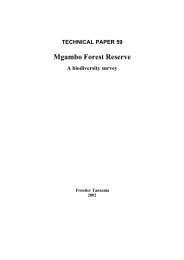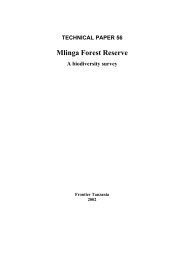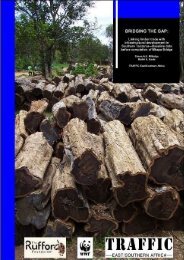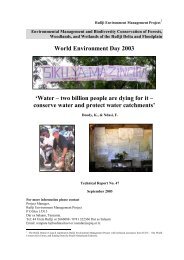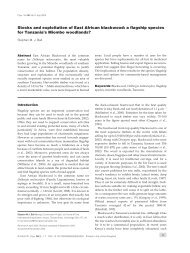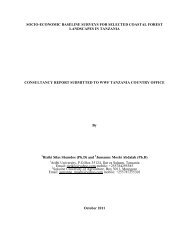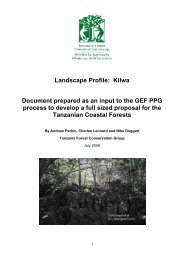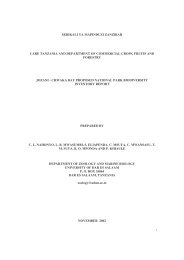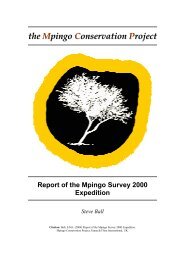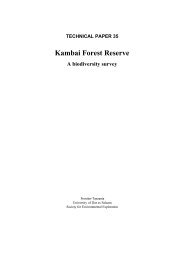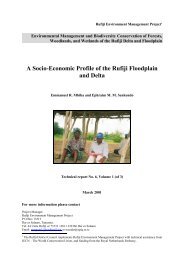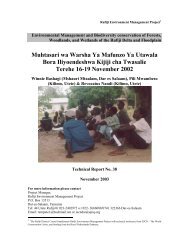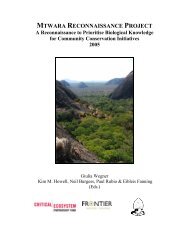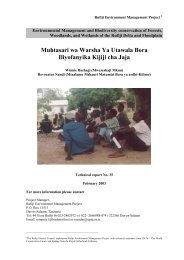Eastern Africa Coastal Forest Programme: Regional Workshop ...
Eastern Africa Coastal Forest Programme: Regional Workshop ...
Eastern Africa Coastal Forest Programme: Regional Workshop ...
You also want an ePaper? Increase the reach of your titles
YUMPU automatically turns print PDFs into web optimized ePapers that Google loves.
possibly the level of threats in the areas. <strong>Forest</strong> that are noticeably rich in species for<br />
their size and forests with relatively high endemism Pugu, Rondo Plateau, Litipo,<br />
Matumbi hills, Kichi Hills, Zaraninge, Pangani falls, Litipo, Pindiro and Mlola. More<br />
surveys and analysis are required to obtain enough data before priority setting.<br />
Since 1990s WWF realised the facts that coastal forests in Tanzania have global<br />
biodiversity and national socio-economic values, and are highly prioritised by the<br />
<strong>Forest</strong> Department through the Tanzania <strong>Forest</strong> Action Plan (TFAP, 1988) for<br />
conservation due to their values, and are facing increasing pressure and threats<br />
resulting from a combination of human activities including: shifting cultivation,<br />
illegal timber extraction, forest fires, commercial and subsistence hunting, and<br />
encroachment for farming and settlement.<br />
In response, WWF began a project in 1991which strives to achieve the conservation<br />
of coastal forests through a combination of active protection measures and local<br />
community’s efforts, in collaboration with the <strong>Forest</strong> Department, district authorities,<br />
village governments, local NGOs and other donor agencies. The goal of the project is<br />
to conserve representative samples of lowland coastal forests in Tanzania. The<br />
immediate objectives are:<br />
Villages, districts and forest department have the institutional capacity to manage<br />
and protect key forests in coast region<br />
Ecosystems within forest reserves are conserved through efficient management<br />
systems acceptable to, and including the participation of, local communities.<br />
Local communities develop an alternative resource base to reduce pressure on<br />
selected coastal forests<br />
Local communities attain greater awareness on conservation and sustainable<br />
resource use through a programme of education and awareness.<br />
Biological and socio-economic surveys and monitoring provide a basis for forest<br />
reserve management<br />
Lessons learned and recommended next steps with EACF conservation:<br />
• The current new national <strong>Forest</strong> Policy (1998) which advocates on involvement<br />
of all key stakeholders in managing forest resources, is a good opportunity for<br />
initiating a broader coastal forest programme involving a wide range of<br />
stakeholders.<br />
• Following tangible success of existing site level projects a scaled up regional<br />
programme is now necessary as it allows for a holistic approach to tackling root<br />
causes and ensure upgraded capacity for impact on conservation.<br />
• Regulation of timber trade in the region needs emphasis in the proposed<br />
programme borrowing some experiences by the people and plant programme in<br />
Kenya, where wood caring project had much positive impact.<br />
• The EACP should come up with longer proposed time frame (10-15 years) to<br />
provide for more capacity building potential and involvement of partners.<br />
• Assess alternative resource and income generating activities for human livelihood<br />
and marketing options.<br />
• The EACP should mainly be playing a facilitation role to the local partners and<br />
very mini9mum implementation role at field level to strengthen local programme<br />
ownership, responsibility, knowledge base and consequently sustainability of<br />
programme initiatives.<br />
• Considering scattered national coastal forest initiatives by different players there<br />
is a need to establish national coastal forests network/partnership and EACF<br />
initiatives co-ordinated in a regional scale.<br />
<strong>Eastern</strong> <strong>Africa</strong> <strong>Coastal</strong> <strong>Forest</strong>s - 11 - <strong>Workshop</strong> Report, Nairobi February 4-7 2002



